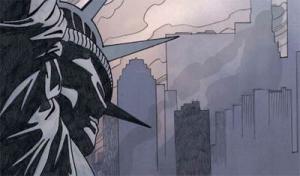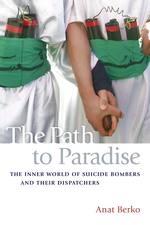Serendip is an independent site partnering with faculty at multiple colleges and universities around the world. Happy exploring!
Towards Day 19: "Real life is in paradise"

Course Notes by Tyl and by FatCatRex
 |
 |
I. coursekeeping
today's notetakers: Amanda and Emily T
for Thursday, finish reading Anat Berko's The Path to Paradise: The Inner World of Suicide Bombers and Their Dispatchers
for the next two weeks, we will be reading approx 200 pp/week, selected from the 369 pp. of Rebecca Skloot's The Immortal Life of Henrietta Lacks and the 457 pp. of Carl Sagan's The Demon-Haunted World; if you can read 100's pps online, you can read these selections via Google Books' generous selections; otherwise you should order now, along with our final text, Robert Coles' The Call to Stories, which we will read in its entirety (240 pp.)
I want to talk a little here about on-line reading:
have just reviewed some very exciting material in a book forthcoming by Katherine Hayles, a chapter called "How We Read," which argues for "a disciplinary shift to a broader sense of reading strategies and their interrelationship," and concentrates on the concept of "hyper reading": "reader-directed, screen-based, computer-assisted reading [including] search queries...filtering by keywords, skimming, hyperlinking, "pecking" (pulling out a few items form a longer text), and fragmenting...juxtaposing, as when several open windows allows one to read across several texts, and scanning, as when one reads rapidly through a blog."
This sort of "distant" or "machine" reading is very different process than the kind of "close reading" valorized in most (and this) English and Creative Writing Departments...
See also this Thursday and Friday: RE: Humanities @ HC: A Symposium on Digital Media in Academia
Betwixt and between reading Hayles' work,
I finished your papers and put the comments on-line;
you'll see that, before I read each one,
I re-read last month's project, and spoke to you comparatively about the directions of your work;
am happy to speak w/ any of you individually
about your writing, if you'd like
(in particular about stylistic or organizational
questions that I didn't want to address on-line);
also urge you to read one another's work,
if you haven't already
(my links generally only go in one direction,
depending ONLY on who I read first!)
4 of you spun off (in fascinatingly different directions!) from our dictionary exercise:
jaranda wrote on OED vs. Urban Dictionary
smacholdt celebrated the narrative of Johnson's Dictionary
Owl mulled over the limitations of language, &
Aya pretty much dismissed dictionaries for their "contextless"ness
not many of you worked w/ the documentaries:
only pfischer focused entirely on two of them,
cf'ing Tarnation & Thin Blue Line
maht91 meditated on "doubt as the path to truth"
in the latter film, &
rachelr used it to think about the unreliability of memory,
but the film was more an occasion for thought
than the object of thinking in those two essays
kgould asked why we like to be scared ("controlled fear"),
EVD did a parallel examination of why we like crime shows
(to a different end: what productive social value might that liking have?);
platano, similarly, took on the difficulty of changing others' internal reality
SandraG actually took on Arne Naess--and the troubling
problem he raises about the need for population control
ckasorek continued to explore copyright’s relevance in the digital age
FatCatRex looked @ PostSecret, &
veritatemdilexi took on the nonfictional fiction that is Barbie
your third/next/last four pp paper due in three weeks (on Dec. 3);
final 12-pp. paper due when all written work is due (Dec. 17,
and I will want to talk w/ each of you individually before then--
to review what you've done in your first three papers, think
together about what you might most productively do to end the semester (!)
III. first thoughts re: The Path to Paradise?
as commentary on/extension to The 9/11 Report?
smacholdt: While I fully support the idea to read these books back to back to compare/contrast them, I thought that Path to Paradise made the point that the cultures of the US and the middle east do not lend themselves well to comparison. The ideologies of the two counties are just too different.... Hamas leader Sheikh Ahmad Yassin ... responds with the statement that the bomber is not dead, but alive with Allah. All of the actions of a suicide bomber are done in preparation for the afterlife.
Owl: In my education class, we were discussing ... whether bullies or the bullied deserved more attention in a school/ class setting. As in, who is the victim in the a bullying situation? ... As I was reading Path to Paradise, I thought, "Could we all be victims? Victims of the environments that surround us and the pressures that are imposed on us to maintain certain standards?"
FatCatRex: As Anne and I have been discussing in the comments on my second webpaper, the group-think aspect of shared truth presents a unique set of issues, not the least of which is how to authenticate or validate truths when the only checks/balances are one's compatriots. When we all believe the same thing, we are no longer checking the truth critically but instead accept the common status-quo ideas .... Obviously there is motivation for us as individuals to seek out others who believe in the truths we do; we have a need to find and identify those social connections, and to affirm our own perspectives .... The difference is that the individuals Berko interviewed were willing to die for their shared truth(s)...and because group members don't allow their truths to come under scrutiny, because then the sky would fall, what do we do with all the world's conflicting truths?... reading 'Path to Paradise' just reinforced how troubling and circular our struggles for liberation and truth are .... I just wonder how we move past this subjective your truth vs. my truth showdown.
p. 12: Western society, for which human life is the supreme value, finds it difficult to define and understand the suicide bomber's behavior [or: re-constructing reality]
p. 159: "Now we're just passing through. Real life is in paradise...in fact he isn't dead, he's in paradise and he's still alive."
p. 171: For the suicide bombers, such dreams [of paradise] are a concrete reality.
- an Israeli researcher?
- a firm distinction between the 'dispatchers,' the strong ones, the ideologues, and the suicide-bombers, weak personalities with family problems?
- human beings as "smart bombs"?
- Qur'anic sources overridden by modern religious teachers advocating Islam's total war against the corrupt, decadent West?
IV. reading notes
pp. 23, 27, 29, 34, etc: Bernat's corrections--> "Not exactly: actually...."; "There is no doubt that there is no similarity whatsoever..."; "no basis whatsoever in reality...."
p. 31: more murders, higher status
p. 39: "We can do terrible things that a country cannot permit itself to do, so that ties your hands..."
p. 42: "they reconcile the apparent contradiction [of being morally normative] by viewing themselves as the affronted, as those treated unjustly, and they see their acts of murder as legitimate...convincing themselves ttaht they are the real victims."
p. 46: "Inshallah": "with the help of Allah"; "may it come to pass"
p. 48: manifesting masculinity
p. 52: "the meaning of jihad: let there be peace"
p. 74f: Arab women and Internet chat rooms
p. 87: "they wanted the Israelis to feel what we feel. That isn't revenge..."
p. 175: my intention was to open a window for the reader into the inner world of men and women who blow themselves up....research methodology committed me to show empathy...to listen patiently...I often felt myself torn in two. Whether I succeeded or not is for the reader to decide.
To Discuss: the genre of ethnography?
the representation of the real?
Classic ethnography is a specific kind of written observational science which provides an account of a particular culture, society, or community. The fieldwork usually involves spending a year or more in another society, living with the local people and learning about their ways of life. Ethnographers are participant observers. They take part in events they study because it helps with understanding local behavior and thought.
Critical ethnography examines the assumptions behind this methodology...
5 criteria for "Evaluating ethnography," by L. Richardson, Qualitative Inquiry, 6(2), 2000: 253-255:
- Substantive Contribution: "Does the piece contribute to our understanding of social-life?"
- Aesthetic Merit: "Does this piece succeed aesthetically?"
- Reflexivity: "How did the author come to write this text…Is there adequate self-awareness and self-exposure for the reader to make judgments about the point of view?"
- Impact: "Does this affect me? Emotionally? Intellectually?" Does it move me?
- Expresses a Reality: "Does it seem 'true'—a credible account of a cultural, social, individual, or communal sense of the 'real'?"
Course Notes by Tyl and by FatCatRex


